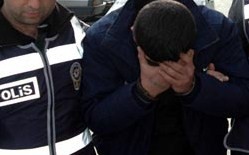
Turkey’s PKK-DTP Operations Further Complicate Kurdish Solution
Publication: Eurasia Daily Monitor Volume: 6 Issue: 77
By:

Simultaneous operations recently conducted in twelve Turkish cities against what police sources described as urban networks of the outlawed Kurdistan Workers Party (PKK) in which 120 people were detained, including senior members of the pro-Kurdish Kurdistan Society Party (DTP) represented in the Parliament, was widely seen as jeopardizing attempts to find a peaceful solution to the Kurdish question. "They [the Kurds] have given a message following the local elections that nobody should fear from the Kurds. But they [the political authorities] could not stand this. They have launched an operation against our party [DTP] following the elections," Ahmet Turk, DTP Chairman and Deputy stated in London (Sabah, April 21).
Emine Ayna, DTP Deputy Chairman, claimed that the underlying reasons for launching the operations were political and also aimed at sabotaging the ceasefire extended by the PKK until June 1 (Milliyet, April 15.) Although the DTP won only 5.5 percent of the vote at a national level during the March 29 local elections, it now controls eight provincial municipalities in the east and in the Kurdish-dominated southeast, doubling the number of municipalities it won in 2004.
Turkish security forces initiated a nationwide operation early last week describing it as the culmination of a two-year long investigation into the PKK’s urban network during which DTP members -including several senior local party members- were also detained.
Police sources told Jamestown that on April 20 they had received a tip off relating to a major assault being planned in the Kurdish dominated southeastern province of Diyarbakir -which was at the center of police raids. A group known as the Kurdistan Democratic Society Confederation (KCK), affiliated with the PKK, has been controlling all illegal activities of the organization within Turkey, according to police intelligence sources (Zaman, 15 April).
Taking its orders from the PKK camps in northern Iraq, the organization has been accused of inciting public hatred and organizing Molotov cocktail attacks on private and public vehicles as well as police and gendarmerie property. KCK militants have also been accused of attending the PKK’s international meetings and implementing its orders. The same sources indicate that the KCK operates similar to a state, with its own parliament and decision-making mechanisms. The group allegedly takes orders from PKK leaders such as Murat Karayilan, Sabri Ok, Cemil Bayik and Zubeyir Aydar (Today’s Zaman, April 14).
A police source told Jamestown that while the KCK gives the impression that it is a civilian grouping preparing the basis for a Federal Turkish state as outlined in the eight-point declaration of the DTP, it is also covertly linked to the PKK’s armed wing -the Peoples’ Defense Forces. However, police sources ruled out any links between the pending court hearing of the DTP’s closure case and these operations.
"It is inevitable that the latest operations are being perceived as attempts to further justify and influence the court’s pending decision on the DTP. But the main aim behind the start of the operations has not been to facilitate the work of the court to close the DTP but apparently an imminent threat emerged of possible attacks against various Turkish targets," police sources told Jamestown.
The Supreme Court of Appeals Chief Prosecutor Abdurrahman Yalcinkaya filed a closure case against the DTP on November 16, 2007 for being the "focal point of separatist acts" and for "alleged ties to the PKK." The case is still under consideration by the court. Police sources recalled that the court has numerous documents establishing linkage between the DTP and the PKK, which does not necessarily require additional evidence as a result of the latest operations.
"The DTP closure case is a political one and I do not believe the party will be closed down," said a Turkish legal expert speaking to Jamestown on April 15. According to Altan Tan, a Kurdish intellectual and a politician, if the aim of the latest operations against the PKK and DTP has been to shut down the political channels for the Kurdish problem and to force the DTP to go to the mountains (to fight) then the operations were wrong (Sabah, April 20).
Moreover, the DTP’s gains in the southeast during the March 29 elections have brought a great deal of psychological relaxation to the already tense region, Tan added. These massive anti-PKK operations during which many DTP members were also detained, comes at a time when expectations were raised for an increased emphasis on non-military solutions to address the PKK problem and resolve the Kurdish question. The operations have also come in the midst of a decision to indefinitely postpone a Kurdish conference planned to be held later this month in Northern Iraq.
Turkey has been fighting against the PKK, -which seeks self rule for the Kurdish dominated southeast- for almost 30 years now. Ayna declared that the DTP will organize a nationwide walk to Ankara to protest against the latest detentions, as well as to force a halt to the Turkish military operations in response to PKK’s ceasefire decision by June 1 (Turkish news agencies, April 21).




